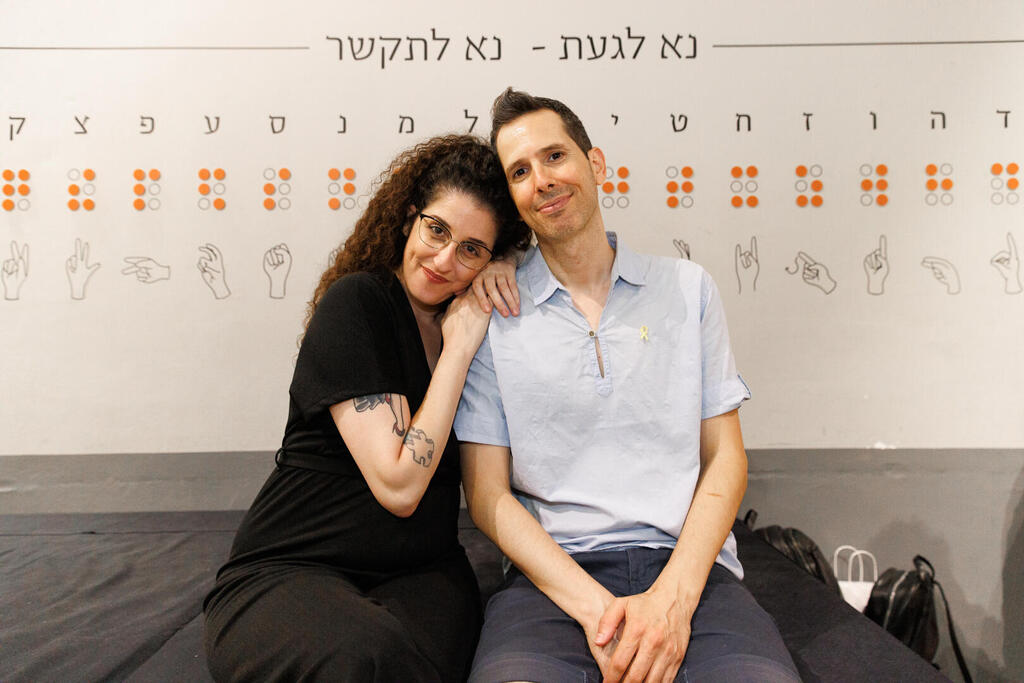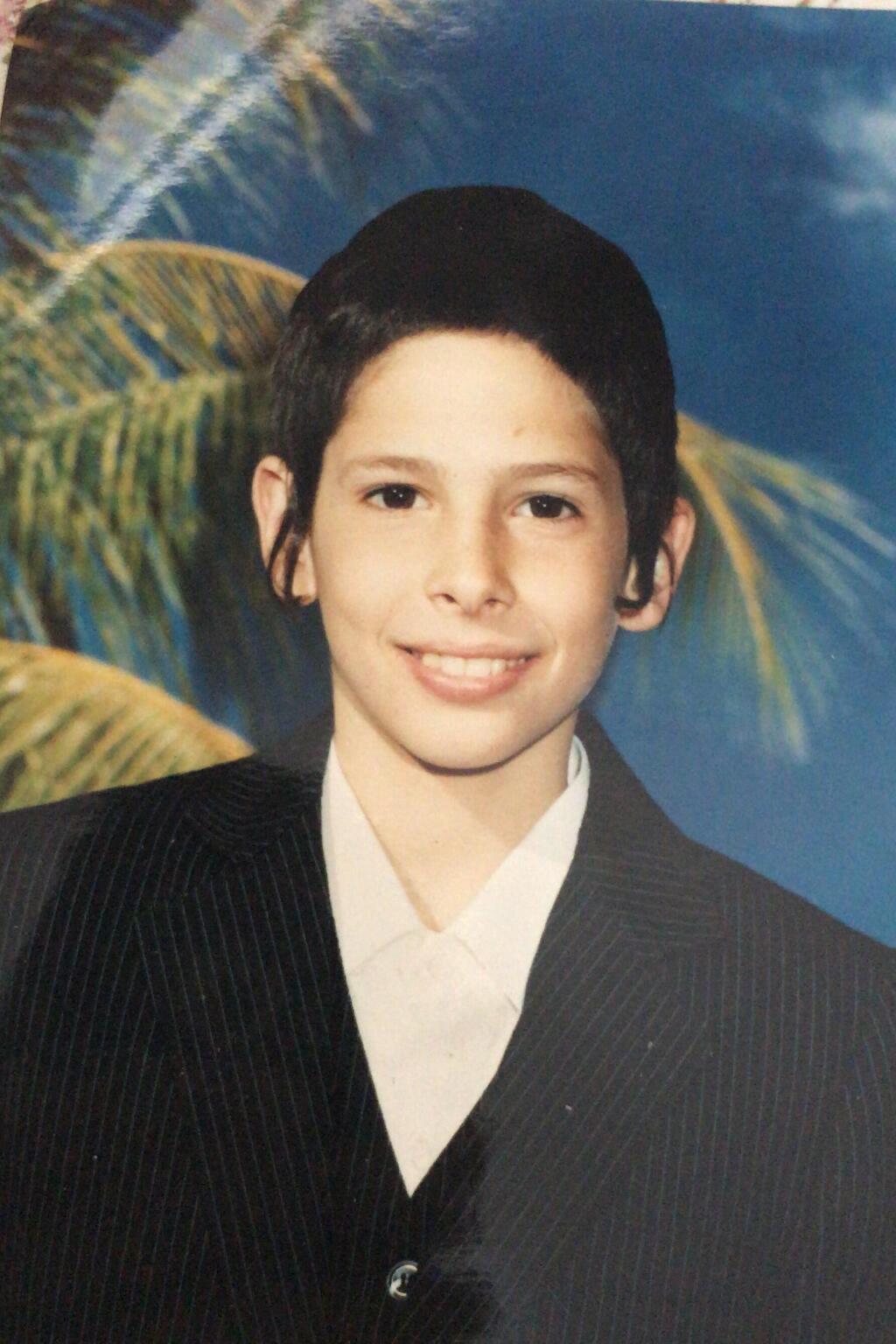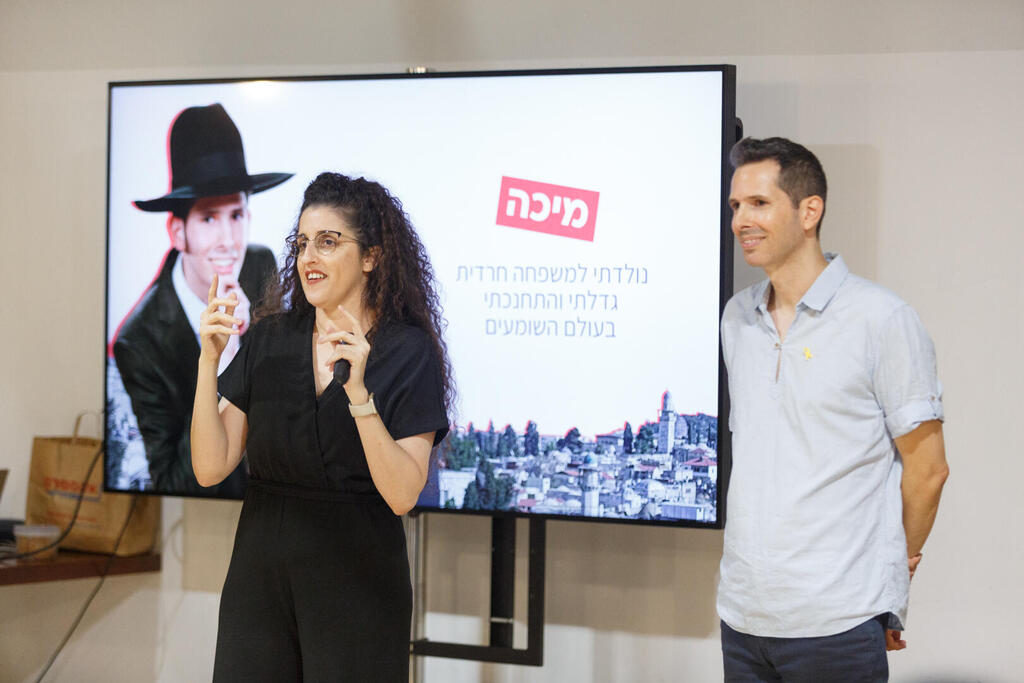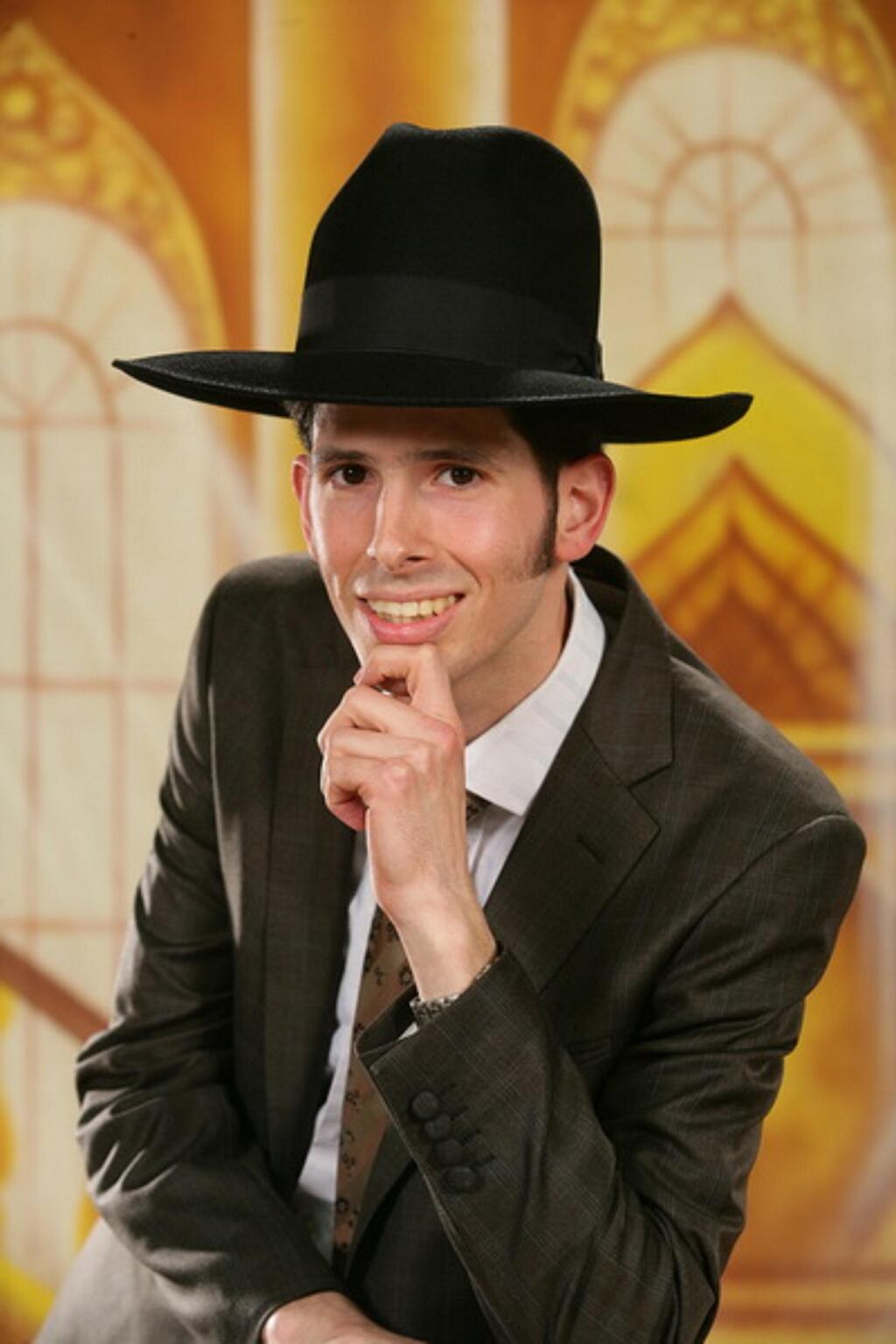Getting your Trinity Audio player ready...
Eight years have passed since Micha Koitni and Lola Adir first met at a sign language course held at the Silvia Bumper club, a meeting space for both deaf and hearing individuals. Even now, they speak of that encounter with heartfelt excitement.
Born deaf to hearing parents in a Lithuanian ultra-Orthodox family, Micha’s world couldn’t have been more different from Lola’s, who grew up in the settlement of Alfei Menashe. Yet, the connection between their contrasting worlds has been a fascinating journey.
"I was a bit nervous when I arrived at the club," Micha recalls. "Suddenly, I saw this beautiful woman with long hair, a tattoo, drinking beer and signing fluently. A friend told me, ‘Go talk to her.’ I approached her, and now we’ve been together for eight years. It’s a great love."
"We both came into the relationship as adults who knew what we wanted," says Lola. "I had just come out of two years where I didn’t want a relationship at all due to a personal crisis, partly following my father’s death. I felt ready for a fresh start."
How did your families react to your relationship?
Lola: "There wasn’t any real opposition, but at first, they asked if it would be hard for me or if I’d need to help him. Over time, they realized he doesn’t need help and that I’m not his caregiver. This is a great love like any other. Once you have a shared language, mutual care and a willingness to make things work, it really doesn’t matter what others say. Some questioned the challenges of such a relationship, but honestly, what relationship doesn’t have challenges and gaps to address?"
"We don’t need to prove our love; we love each other," Micha adds.
After eight years together, isn’t it time to talk about marriage?
Lola: "We’ve never been interested in a wedding ceremony. We’re registered as common-law partners, and that’s as married as it gets for us."
Micha, 43, a social activist and food blogger who creates sign language and subtitled content on social media, and Lola, 37 (whose official name is Ella Yael), produce accessible content and videos together and give a lecture called "Talking with Hands." In thh last week, they have shared their life story at a special event as part of the "Please Touch: Art Beyond Limits" festival, which opens at the "Please Touch" Center in Jaffa Port.
The festival, which celebrates the International Day for Equal Opportunities for People with Disabilities, also featured appearances by notable figures such as Lior Ashkenazi, Dvir Benedek, Anat Atzmon, Daniel Salomon, Haim Be'er, Karni Postel, and Yoav Ginai.
Childhood in silence
Micha was born in Petah Tikva into a Lithuanian ultra-Orthodox family. His younger sister is also deaf. "When I was six months old, my parents noticed I didn’t respond when they called me. They took me to Sheba Medical Center for a hearing test and discovered I was deaf," he recalls. "They were at a loss. They were told there were several options, including hearing aids and schools where deaf and hearing children study together."
"I attended mixed kindergartens and schools, with both hearing and deaf students. Often, when the teacher turned to the board and spoke at the same time, I missed what was being said because I couldn’t read her lips. My classmates didn’t help me at all. I’d come home and review the material to catch up on what I’d missed in class."
In eighth grade, Micha moved to a yeshiva. "We studied Torah from seven in the morning until 11 at night," he says. "There were about 500 hearing students, and I was the only deaf one. Since they knew I was deaf, they helped me."
At 27, Micha received a cochlear implant, thanks to his sister, who also had one. "I was able to recognize sounds, but it didn’t make me hear like a person without hearing loss. Today, I can identify cars on the road, even voices, but fully understanding words is still difficult."
At some point, Micha felt he wasn’t progressing in his yeshiva studies and asked to leave. It took time to convince his parents. "I started working under two conditions – first, that I’d work in a public job suitable for religious people, and second, that I’d finish work by 5 p.m. and continue studying Torah for two to three hours afterward."
What about matchmaking?
"In the yeshiva, everyone married at a very young age, and I was very jealous. The few matches I went on were complicated, and before every meeting, I was investigated thoroughly. In many cases, the match was rejected even before I met the girl.
"They would say I was an honest man, a good person, God-fearing, but that I had too many shortcomings– my father is Ashkenazi, my mother is Yemenite – in short, a mixed heritage. In the ultra-Orthodox world, Ashkenazis and Sephardic don’t mix in matchmaking. The fact that I’m deaf was also a disadvantage. It was only when I entered the working world that my perspective began to widen."
Were you disappointed?
"I came to terms with reality. All my siblings got married. When my younger brother wanted to get married, he had to ask for my permission because I’m the oldest. I told him, ‘Go ahead, don’t wait for me. Get married.’"
'I discovered life could be bright too'
After leaving the yeshiva, Micha started working in a baby products store. "On the way to work, I’d always sit in the back of the bus, so people wouldn’t notice my implant," he recalls. "One day, I noticed a fellow passenger making all sorts of hand movements. I was shocked. It was the first time I saw someone communicating in sign language."
How did you react?
"I approached him and asked, ‘Excuse me, what is this?’ He replied, ‘What, are you kidding me? It’s sign language.’ After he finished his conversation, we started talking openly. He explained what it was and began teaching me basic signs, like ‘good morning,’ ‘good evening,’ and ‘Shabbat Shalom.’"
It surprised you that much?
"The religious world is very closed. I thought speech was all there was. I told my parents about it, and they told me not to use my hands to communicate. I asked why, and they replied, ‘What do you prefer – to communicate like a mime or like a normal person?’ ‘Of course like a normal person,’ I answered, and at that moment, I decided not to bring it up with them again."
The following day, Micha once again encountered the deaf man on the bus. This time, he sat next to him, and the man continued teaching him additional signs. "I asked him where I could meet more deaf people," Micha recalls. "He immediately replied, 'Come to Yehud, there's a deaf soccer game there once a week.'"
Micha followed his suggestion and arrived at the soccer field in Yehud, only to be taken aback by what awaited him. "Everyone was speaking in sign language," he remembers. "I stared at them in shock, amazed that they understood each other without asking questions."
How did they react to you?
"I was the only religious person there. They looked at me and asked, 'Did you come here by mistake? Did you fall from the moon?'"
When Micha returned home, he felt the need to examine himself and understand whether he was taking a risk with his actions. "On Shabbat, I told my parents I was going to study Torah. I went to the yeshiva, hung up my suit, removed my kippah, and my heart was pounding," he recounts with excitement, reflecting on the moments when he acted against the principles he had been raised with for 30 years.
"I quickly left the yeshiva, headed toward the intersection, and caught a sherut taxi, line 51, to Tel Aviv. The driver asked me, 'Are you getting in?' I checked to make sure no one familiar was watching me and got in. After all, the Torah says that someone who desecrates Shabbat is to be put to death. And here I was, sitting in a sherut taxi, realizing everything was fine. The doors closed, and I told the driver, 'Please drive, drive,' and he didn’t understand what I wanted from him.
"When we started driving, I felt someone tap me on the shoulder, and I panicked. I imagined my father had caught me red-handed. It turned out that one of the passengers was handing me five shekels to give to the driver," he shares. "When I got off the taxi in Tel Aviv, I was in shock. Suddenly, I discovered that life is actually bright and that people walk around the streets without worry. For 30 years, I hadn't felt good about myself. That was the moment I realized I didn’t want to go back."
On his way home, after getting off the return taxi to his city, Micha re-entered the yeshiva, put on his kippah, and donned the suit that had been waiting for him where he had left it.
"When I got home, everyone asked me, 'Why is your face red?'" he recalls. "I remember panicking and thinking to myself: they'll throw stones at me if I tell the truth. 'I sat outside and read in the sun,' I quietly answered, and my parents responded, 'Good for you, we're proud of you.' I was both lying and had also ridden a taxi on Shabbat – and yet, I was still alive."
When did you tell your parents?
"A few weeks later. I approached them and said, 'If you thought I went out to study Torah, I'm sorry – I went out to hang out with friends. You know, I'm already 30 years old. I have a different life now, one that's different from the past, and I'm enjoying it.'"
Lola: "Among other ultra-Orthodox families, the connection would have been severed in such a case, and Micha expected that to happen with his family as well. But it didn’t."
Breaking stereotypes
Lola was introduced to sign language during her military service as an educational soldier. "In one of the programs where I taught children and teens with cerebral palsy, where some also had speech or hearing impairments, I began gathering information about sign language," she shares. "I had a plan that once I finished my service, I would study sign language professionally because the language fascinated me. Ten years later, I fulfilled that plan."
Why only a decade later?
"When I was 25, my father died after a long illness. That was a turning point for me, lasting three years. The decision to take this step was part of my effort to overcome that crisis. At the time, I was mainly working in hotels, with lots of night shifts and minimal interaction with people. When I decided I needed to get back on my feet, I returned to sign language, but this time I studied it seriously."
In their lectures, Lola and Micha aim to challenge common but misguided perceptions about deaf and hard-of-hearing individuals through personal stories and plenty of self-deprecating humor. "Misunderstandings between deaf and hearing people are often very funny," she says with a smile.
"One of the issues important to us and many other deaf social activists is erasing the stigma that a deaf person is pitiful and reliant on charity. You could say that deaf people begging for money give a bad name to the entire hard-of-hearing community," she adds. "Often, when people hear Micha speak, they think he has a cognitive or intellectual issue. But in the end, it's just his speech that’s different. Of course, beyond that, there are many changes that the state and public institutions still need to implement."
What changes, for example?
"We often encounter situations where service representatives call our home and insist on speaking with Micha to approve certain bureaucratic matters listed in his name. Or, when I speak to representatives from the bank or insurance company, they insist on talking to him as well. Every time, I have to explain again that he can’t talk on the phone and that I can identify myself on his behalf – he can’t. Today, there’s the option of video calls – why not use that technology for identification processes?"
Are there enough interpreters in Israel today?
"There are between 200 and 300 interpreters, but more are needed. It’s important to remember that 20–30 years ago, awareness of sign language was very different from what it is today. Back then, doctors recommended teaching children to speak rather than use sign language. Today, some TV programs include interpreters, but unfortunately, not all of them do."
Their work in blogging about cooking and giving lectures fills their lives. "When I lived with my parents, I didn’t know how to cook. The only two dishes I could make were toast and an omelet," Micha shares. "The kitchen was my mom’s special room. When Lola and I moved in together, I decided I wouldn’t order takeout and started cooking."
Get the Ynetnews app on your smartphone: Google Play: https://bit.ly/4eJ37pE | Apple App Store: https://bit.ly/3ZL7iNv
Lola: "When we started living together, I didn’t eat meat. I told him, 'If you want to eat meat, you’ll have to cook it yourself.' Since I was diagnosed with cancer, and especially now with my health values being very poor, I have to eat meat. I decided my health is more important than anything else, and dealing with the illness is already overwhelming – so adding a dietitian’s menu on top of it? I preferred to avoid more bureaucracy."
Lola continues, "Two months ago, I was hospitalized at Ichilov for two and a half weeks. Usually, when a deaf person arrives for treatment or a checkup, an interpreter accompanies them. This time, it was the opposite – I was the patient, Micha was the one accompanying me, and I had to both talk to the doctors and translate what they were saying to Micha."
During this time, new communication challenges emerged between them. "When I was recovering after surgery, I had oxygen masks on and swollen hands, so I couldn’t sign or spell out words to him," Lola explains. "There were moments that later made us laugh – I meant to tell him I was thirsty, and he understood that I was happy. So, I grabbed his hand and started writing on it, and that’s how we communicated."





